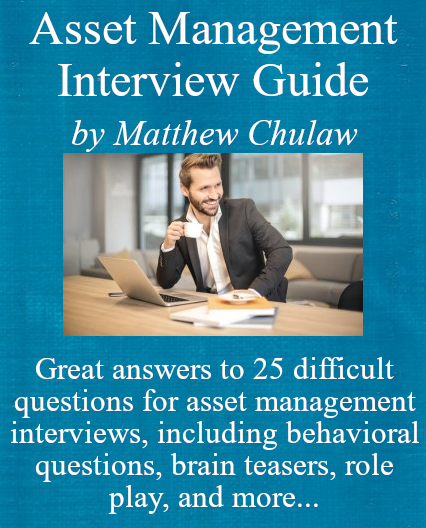Dear job seeker,
I will keep this page short and to the point. Here’s what I have for you today:

* Updated and discounted in March 2024.
In the eBook, you will find multiple great answers to each of the following questions:
- Why do you want to work in asset management?
- Where do you want to fit into our asset management firm? Investment, distribution, or support?
- In your opinion, what role does relationship building play in this business?
- What is your attitude to risk?
- Imagine that we are under-perfoming, and didn’t beat the stock market (or other relevant benchmark) in a given year. How will you announce the news to the clients?
- Which asset class would you like to specialize in and why?
- You are participating in a networking event in a city, and see a VP of a middle sized company running a pension scheme for their employees. They do not work with any asset management company at the moment. How will you approach them?
- Tell me about an obstacle you overcame.
- Describe a time when you struggled to build a relationship with someone important. How did you eventually overcome that?
- Give us an example of an occasion when you used logic to solve a problem.
- Describe the situation in which you were able to use persuasion to successfully convince someone.
- How do you handle rejection?
- Sell me this pen (or any other object on the table).
- How many cabs are on the streets of London at this moment?
- If you had one million dollars to invest right now, your own money, what would you do with it?
- … and ten other tough questions you may face in your interview for a job in asset management.
Check the sample to see how this eBook can help you:
Sample from the eBook
Q: What is your attitude to risk?
Hint: You should be neither a gambler, nor a coward. Say that you have a neutral attitude to risk. You look at it without emotions. What matters for you are the preferences of your clients–whether they want to take risks, and perhaps earn more as a reward, or they opt for a conservative investment strategy.
You, as an excellent asset manager, or analyst, have plans and suggestions ready for each scenario. Trying to understand the financial goals of the client, the worth of their assets, and their attitude to risk, you are ready to pick the most suitable investment opportunity, or portfolio. It can be real estate, gold, S&P 500, stocks of some emerging tech companies, or even drinking water–maybe soon the most precious asset of all…
Sample answers
– I do not have any particular attitude to it. I simply accept it as a part of the game. When we invest money, some risks are always present, and clients should be aware of them. My goal is to match their expectations, and their level of risk aversion, with the right investment or portfolio. I can assure you that I do not wake up in the middle of night, soaked with sweat, after having a bad dream of losing some money in a short run. I can live with the possibility of losing money.
– It is just a variable, something I try to count with in my analyses. To be honest, I try to distance myself emotionally from risk, or from other factors I work with. I try to focus on numbers, and do not imagine what could happen, or would happen, if some negative scenario materialized in the markets.
I simply do my research, and try to offer precise analysis and suggestions. Some of my analyses can prove wrong—the risk is always present, but that’s something each analyst has to count with. I try to minimize the chances with precise work and attention to detail.
Q: Which asset class would you like to specialize in, and why?
Hint: You can find different classifications of assets, and it is a good idea to try and find out which classification they use in the investment company. Sometimes you may find the information on their website, or you may get a clue following social profiles of the leading figures and portfolio managers.
In any case, you do not have to know what you’d like to specialize in while applying for an internship role. In that case it is enough saying that you’d like to learn more about each asset class during your stint with the company, and will decide later.
If you apply for a regular job, however, you should have your preferences. And you can justify it in several ways. One is your attitude to risk: if you prefer to play safe, and would like to manage money of clients who also play safe, you will likely opt for bonds or commodities like gold.
Another option is referring to your knowledge and passion for certain asset class. If you’ve been following the stock market for years, learning the ins and outs and investing yourself, or even working as a private financial advisor up to this point, it makes a perfect sense to specialize in equities.
The last idea is trying to find out what they would like you to specialize in: job description can help here, or understanding the portfolios they manage at the moment. If the company invests heavily in real estate, it makes a lot of sense to pick it for your specialization.
And if you aren’t sure, you can always add that you are ready to adjust your choice to the needs of your employer, the type of portfolio they want you to manage, or type of assets they want you to analyze, or sell to their clients.
Sample answers
– I do not really have any preference at the moment. Sure, stocks interest me more than commodities, but I hope to get a glimpse of everything during my internship with you. Once I understand how different markets work, pluses and minuses of each one, and also how analyzing different asset classes matches with my strengths, I will be able to make a good decision. What’s more, it is also important that my choice reflects the situation on the employment market, once my internship ends. If you offered me a position of a research analyst specializing in bonds after my internship, I would likely accept it, regardless of my preference.
– I’ve been following the stock market for years, investing my own money, doing countless analyses, trying to devise right investment strategies. For this reason, I’d like to specialize in equities. It would make no sense to opt for any other asset class, considering the value I can bring to the team while specializing in equities.
– I do not have a preference when it comes to asset class, but I’d like to work with clients from the Middle East. I have a lot of history with the region, and understand it culturally. I also speak Arabic—it will make my job much easier. What’s more, I see a huge opportunity here, since the market isn’t saturated, and we can certainly acquire some big clients with the right strategies.
End of the sample
These were just two questions. You will find 25 in the eBook, including difficult behavioral questions, a role play (sell me this pen/notepad), and some brain teasers. But that’s not all.
To ensure you will get the job, I included in the book seven principles you need to understand before you can ace your interview for an asset management job.
Without talking too much about them, let me show you another sample from the book:
Sample no. 2
Principle no. two: Show willingness to learn and adapt
Maybe you are the best salesman in the city, or the brightest analyst. You have your own way of doing things, and are ready to take their company to the next level with your work. You are brimming with ideas, and cannot wait to put them to the test in the real environment of an asset management.
However, this is not how it works in a corporate sphere. You will receive an extensive training before picking the phone for the first time, before meeting your first client, or doing your first analysis.
They will teach you everything, from lead generation to cold calling, from dealing with objections to signing contracts, from collecting data to analyzing them and reporting—depending on your position, of course.
And you should obey, because their strategies have been proven by time, their sales and data analysis methods have been bringing money to the company for years on end, and perhaps also helped them to beat the market repeatedly, or any other benchmark they set for themselves.
Certainly they do not represent the pinnacle, the culminating point you can reach in your career, in whatever field. And once you have some successes and experience, and they promote you, and you will manage a portfolio or talk to the most important clients, you may come up with your own sales strategies and methods, and beat the results they achieve with their existing concepts.
But that’s not something you should talk about in an interview. Anytime they ask you about……..
End of the sample

So that’s it. I do not want to waste your time with lengthy sales pages, and imaginary discounts or fake reviews, just like most other people do on their websites, while trying to sell you their digital products.
You have read the samples, you know what the eBook is about, and surely you can tell whether it will help you.
I sincerely believe it will. And you can read it easily in two to four hours, it’s 19,000 words. Only things that truly matter, no secondary content.
Plus, of course, like with everything else we sell here on InterviewPenguin.com, you have a risk free sixty days money back guarantee. If you don’t like this eBook for any reason, or no reason at all, just let me know (email me at matthew[at]interviewpenguin[dot]com) within 60 days, and we will give you a full refund.
Quick Summary

- Brilliant answers to twenty five difficult questions you may get in your interview for a job in asset management (including sales, investment, and support jobs in investment companies and banks).
- Several sample answers to each question, so you can choose one that reflects your values and experience (including answers for people with no working experience; if you apply for internship you’ll always find a good answer in our selection).
- Seven principles of acing the interview, things you simply need to know in order to make the right impression on the hiring managers, to win them over.
- Instant download, .PDF format (you can read it on any device (mobile, kindle, PC), and you can easily print it).
- Secure and simple checkout with PayPal, you can pay with your credit/debit card, or with your PayPal account.
- Price: $13, one time payment, no hidden fees or upsell. 60 days risk free money back guarantee . Sold exclusively on InterviewPenguin.com.
- Click the checkout button below to proceed to the payment.
(After the payment you will be directed back to our website, to a protected page, to download your eBook. You will also receive a download link and instructions to your email, just to ensure that you will get the book without waiting, even if the redirect fails.)
That’s it. Your interview for an asset management job does not have to be stressful, or difficult. You can interview with confidence, and give brilliant answers to all tough questions. Download the guide today, and succeed in your interview.
Sincerely,
Matthew Chulaw,
Your personal job interview coach
P.S. Send me a message if you have any questions. I try my best to answer all emails within twelve hours (matthew[at]interviewpenguin[dot]com).
